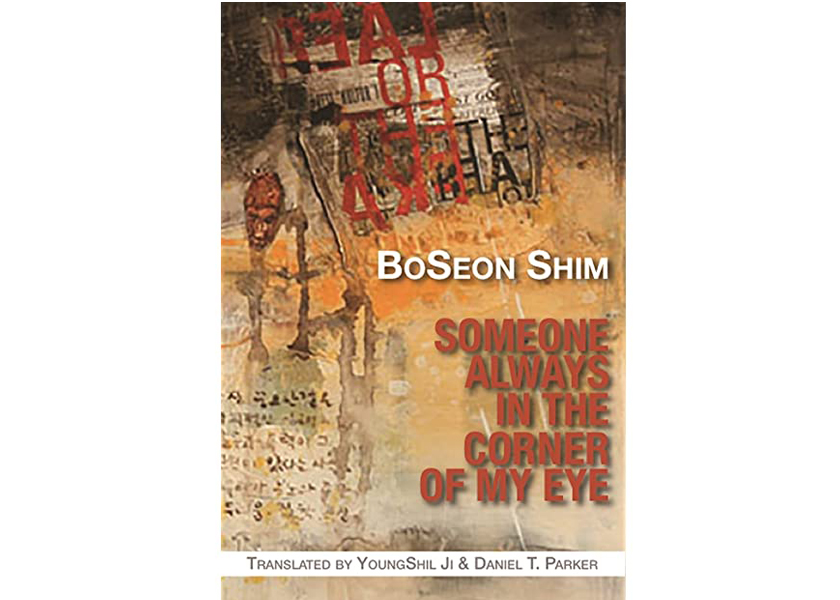Someone Always in the Corner of My Eye ~ By BoSeon Shim
(White Pine Press, New York, 2016, ISBN #978-1-9352-1090-4)
Review by Yearn Hong Choi (Winter 2021 issue)

BoSeon Shim, a social scientist educated at Seoul National University and Columbia University, is not well known yet in Korea, but his new volume of poetry is in English and published in the U.S.
I opened his poetry book with some curiosity, because I have never read his poems and was unfamiliar with his name. As a fellow social scientist/poet, I have also had a dual vocation, writing poetry while teaching public policy and administration. I felt that we are in the same boat.
Shim’s poems are not easy to read or to comprehend. The spirit of his poetry may be puzzling to some readers, and I am not always sure what he is aiming at. However, the fact that Shim is so different from traditional poets makes him interesting.
There is no rhythm in reading his relatively long poems; his sense of form challenges the traditional. His choice of content also is in contrast to traditional topics, such as the poetic glorification of nature. In Shim’s work, there is none of that. Instead, he seems to be saying that the age we live in calls poets to break out of their old forms and try something new.
Reading on, I try to find meaning, enjoying some striking words and stanza in his poems. He accuses his own poetry of being for the depressed and deprived. Can this poet provide comfort too? I hope so. He seems to believe that poetry can be meaningful to people in modern society today.
Shim twists what he observes and looks at the world with a sense of humor, attacking intellectuals who are snobbish and refuse to take responsibility for their actions. However, Shim’s poems are not snobbish at all. I hope his poems can reach out to depressed and deprived people on one side and intellectuals on the other. But in order to be comforted, the reader must first understand the message, and this poet’s messages are difficult to fathom.
The majority of Shim’s poems are a couple of pages, but I like the style of the few short poems in this volume:
Words
There is countless evidence that we have souls.
Today I will reveal one truth.
And tomorrow, another.
Like that, one each day.
Social scientists may see many facets of one truth, in the way that several blind men describe one elephant. This short poem, the prelude of his poetry book, eloquently declares that.
Another short poem is titled None of the World’s Business:
Breaking up with you is none of the world’s business.
I’m waiting for the apocalypse…
We’ll break up after that.
When is the apocalypse?
This short poem sums up the Korean phenomenon of talking about the private affairs of others.
As an old poet, I enjoyed his poem, Good Old Days. He did not experience the good old days as I did. I am nostalgic about those good old days when we were all poor and caring for each other, building a new economic powerhouse from the poverty-stricken country that was left after the Korean War.
I am fascinated by his Fascination, a romantic love poem. The poet writes: “Following fascination,/ time flies like an arrow./ Following fascination,/expressions are shaped by someone in the corner of the eye.” There are other romantic love poems in this book, in which he mixes sexy and jazzy moods with his social scientific description of making love. In these, the title of this poetry book, Someone Always in the Corner of My Eye takes on new meaning.
Then, I tend to agree with the following quotation from NEWSis:
In this book, Shim gives his attention to love. He devotes himself to the activity of love creating useless things, instead of labor producing useful things. Through this, he stresses the importance of changing ourselves by holding each other’s hands and taking a stroll together, instead of the remoteness and loneliness of art.
I cannot fully comprehend the above quotation from the back cover of the poetry book, but I tend to agree: Love is the most beautiful thing in life. I remember the Beatles’ famous slogan “Make love, not war.” Poet Shim may be in the same mindset as the Beatles in the 1960s. Is it love he is talking about? Is it sex? Or perhaps it is both.


